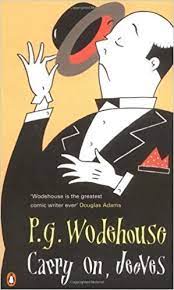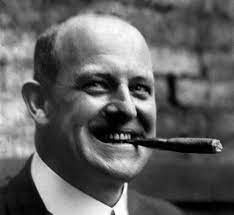Carry On Jeeves Page #7
Carry On, Jeeves is a collection of ten short stories by P. G. Wodehouse. It was first published in the United Kingdom on 9 October 1925 by Herbert Jenkins, London, and in the United States on 7 October 1927 by George H. Doran, New York.
'But lots of fellows have asked me who my tailor is.' 'Doubtless in order to avoid him, sir.' 'He's supposed to be one of the best men in London.' 'I am saying nothing against his moral character, sir.' I hesitated a bit. I had a feeling that I was passing into this chappie's clutches, and that if I gave in now I should become just like poor old Aubrey Fothergill, unable to call my soul my own. On the other hand, this was obviously a cove of rare intelligence, and it would be a comfort in a lot of ways to have him doing the thinking for me. I made up my mind. 'All right, Jeeves,' I said. 'You know! Give the bally thing away to somebody!' He looked down at me like a father gazing tenderly at the wayward child. 'Thank you, sir. I gave it to the under-gardener last night. A little more tea, sir?' 2--The Artistic Career of Corky You will notice, as you flit through these reminiscences of mine, that from time to time the scene of action is laid in and around the city of New York; and it is just possible that this may occasion the puzzled look and the start of surprise. 'What,' it is possible that you may ask yourselves, 'is Bertram doing so far from his beloved native land?' Well, it's a fairly longish story; but, reefing it down a bit and turning it for the nonce into a two-reeler, what happened was that my Aunt Agatha on one occasion sent me over to America to try to stop young Gussie, my cousin, marrying a girl on the vaudeville stage, and I got the whole thing so mixed up that I decided it would be a sound scheme to stop on in New York for a bit instead of going back and having long, cosy chats with her about the affair. So I sent Jeeves out to find a decent flat, and settled down for a spell of exile. I'm bound to say New York's a most sprightly place to be exiled in. Everybody was awfully good to me, and there seemed to be plenty of things going on so, take it for all in all, I didn't undergo any frightful hardships. Blokes introduced me to other blokes, and so on and so forth, and it wasn't long before I knew squads of the right sort, some who rolled in the stuff in houses up by the Park, and others who lived with the gas turned down mostly around Washington Square--artists and writers and so forth. Brainy coves. Corky, the bird I am about to treat of, was one of the artists. A portrait-painter, he called himself, but as a matter of fact his score up to date had been nil. You see, the catch about portrait-painting--I've looked into the thing a bit--is that you can't start painting portraits till people come along and ask you to, and they won't come and ask you to until you've painted a lot first. This makes it kind of difficult, not to say tough, for the ambitious youngster. Corky managed to get along by drawing an occasional picture for the comic papers--he had rather a gift for funny stuff when he got a good idea--and doing bedsteads and chairs and things for the advertisements. His principal source of income, however, was derived from biting the ear of a rich uncle--one Alexander Worple, who was in the jute business. I'm a bit foggy as to what jute is, but it's apparently something the populace is pretty keen on, for Mr Worple had made quite an indecently large stack out of it. Now, a great many fellows think that having a rich uncle is a pretty soft snap; but, according to Corky, such is not the case. Corky's uncle was a robust sort of cove, who looked like living for ever. He was fifty-one, and it seemed as if he might go to par. It was not this, however, that distressed poor Corky, for he was not bigoted and had no objection to the man going on living. What Corky kicked at was the way the above Worple used to harry him. Corky's uncle, you see, didn't want him to be an artist. He didn't think he had any talent in that direction. He was always urging him to chuck Art and go into the jute business and start at the bottom and work his way up. And what Corky said was that, while he didn't know what they did at the bottom of a jute business, instinct told him that it was something too beastly for words. Corky, moreover, believed in his future as an artist. Some day, he said, he was going to make a hit. Meanwhile, by using the utmost tact and persuasiveness, he was inducing his uncle to cough up very grudgingly a small quarterly allowance. He wouldn't have got this if his uncle hadn't had a hobby. Mr Worple was peculiar in this respect. As a rule, from what I've observed, the American captain of industry doesn't do anything out of business hours. When he has put the cat out and locked up the office for the night, he just relapses into a state of coma from which he emerges only to start being a captain of industry again. But Mr Worple in his spare time was what is known as an ornithologist. He had written a book called American Birds, and was writing another, to be called More American Birds. When he had finished that, the presumption was that he would begin a third, and keep on till the supply of American birds gave out. Corky used to go to him about once every three months and let him talk about American birds. Apparently you could do what you liked with old Worple if you gave him his head first on his pet subject, so these little chats used to make Corky's allowance all right for the time being. But it was pretty rotten for the poor chap. There was the frightful suspense, you see, and, apart from that, birds, except when broiled and in the society of a cold bottle, bored him stiff. To complete the character-study of Mr Worple, he was a man of extremely uncertain temper, and his general tendency was to think that Corky was a poor chump and that whatever step he took in any direction on his own account was just another proof of his innate idiocy. I should imagine Jeeves feels very much the same about me. So when Corky trickled into my apartment one afternoon, shooing a girl in front of him, and said, 'Bertie, I want you to meet my fiancée, Miss Singer,' the aspect of the matter which hit me first was precisely the one which he had come to consult me about. The very first words I spoke were, 'Corky, how about your uncle?' The poor chap gave one of those mirthless laughs. He was looking anxious and worried, like a man who has done the murder all right but can't think what the deuce to do with the body. 'We're so scared, Mr Wooster,' said the girl. 'We were hoping that you might suggest a way of breaking it to him.' Muriel Singer was one of those very quiet, appealing girls who have a way of looking at you with their big eyes as if they thought you were the greatest thing on earth and wondered that you hadn't got on to it yet yourself. She sat there in a sort of shrinking way, looking at me as if she were saying to herself, 'Oh, I do hope this great strong man isn't going to hurt me.' She gave a fellow a protective kind of feeling, made him want to stroke her hand and say, 'There, there, little one!' or words to that effect. She made me feel that there
Translation
Translate and read this book in other languages:
Select another language:
- - Select -
- 简体中文 (Chinese - Simplified)
- 繁體中文 (Chinese - Traditional)
- Español (Spanish)
- Esperanto (Esperanto)
- 日本語 (Japanese)
- Português (Portuguese)
- Deutsch (German)
- العربية (Arabic)
- Français (French)
- Русский (Russian)
- ಕನ್ನಡ (Kannada)
- 한국어 (Korean)
- עברית (Hebrew)
- Gaeilge (Irish)
- Українська (Ukrainian)
- اردو (Urdu)
- Magyar (Hungarian)
- मानक हिन्दी (Hindi)
- Indonesia (Indonesian)
- Italiano (Italian)
- தமிழ் (Tamil)
- Türkçe (Turkish)
- తెలుగు (Telugu)
- ภาษาไทย (Thai)
- Tiếng Việt (Vietnamese)
- Čeština (Czech)
- Polski (Polish)
- Bahasa Indonesia (Indonesian)
- Românește (Romanian)
- Nederlands (Dutch)
- Ελληνικά (Greek)
- Latinum (Latin)
- Svenska (Swedish)
- Dansk (Danish)
- Suomi (Finnish)
- فارسی (Persian)
- ייִדיש (Yiddish)
- հայերեն (Armenian)
- Norsk (Norwegian)
- English (English)
Citation
Use the citation below to add this book to your bibliography:
Style:MLAChicagoAPA
"Carry On Jeeves Books." Literature.com. STANDS4 LLC, 2024. Web. 22 Dec. 2024. <https://www.literature.com/book/carry_on_jeeves_1506>.




Discuss this Carry On Jeeves book with the community:
Report Comment
We're doing our best to make sure our content is useful, accurate and safe.
If by any chance you spot an inappropriate comment while navigating through our website please use this form to let us know, and we'll take care of it shortly.
Attachment
You need to be logged in to favorite.
Log In